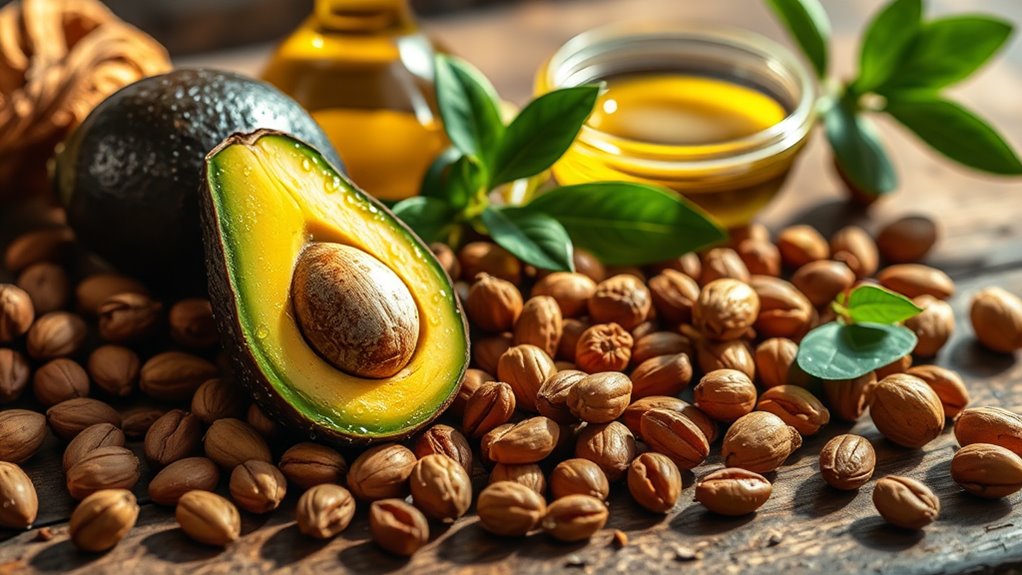Why Eating Fat Doesn’t Mean You’ll Gain Weight
Eating fat doesn’t automatically lead to weight gain. Healthy fats, like those from avocados and nuts, are crucial for nutrient absorption and hormone production. They can actually enhance feelings of fullness, help regulate appetite, and support metabolic health. It’s important to choose fats wisely and control portions to avoid excess calories. Understanding the complexity of dietary fats can empower your food choices. Stay tuned to explore how to incorporate healthy fats into your meals effectively.
Understanding Different Types of Fats
When you think about fats, it’s crucial to recognize that not all fats are created equal.
The healthy fat truth reveals that fats can be categorized into saturated, unsaturated, and trans fats.
While unsaturated fats, like those found in avocados and nuts, support heart health, saturated and trans fats may contribute to health risks. Understanding these differences is essential for making informed dietary choices. Additionally, incorporating nutrient-dense snacks can help stabilize energy levels and support overall health.
The Role of Healthy Fats in the Diet
Healthy fats play a vital role in your overall diet, providing numerous benefits that go beyond simple energy supply. They’re essential for nutrient absorption, hormone production, and maintaining cell structure. Incorporating healthy fats helps support cognitive function and heart health. Moreover, understanding that not all fats are harmful encourages a more balanced approach to eating.
| Type of Fat | Benefits | Sources |
|---|---|---|
| Monounsaturated | Improves cholesterol levels | Olive oil, avocados |
| Polyunsaturated | Supports brain health | Fatty fish, nuts |
| Saturated (in moderation) | Hormone regulation | Coconut oil, grass-fed dairy |
How Fats Affect Metabolism
Fats, being a key macronutrient, significantly influence your metabolism by affecting how your body processes energy and stores nutrients.
They play a crucial role in hormone production and can enhance the feeling of satiety, leading to better appetite regulation.
Additionally, healthy fats facilitate the absorption of fat-soluble vitamins, contributing to overall metabolic health and energy balance in your daily life.
The Importance of Portion Control
Balancing fat intake with portion control is vital for managing weight effectively.
While healthy fats can provide essential nutrients, overeating them can lead to an excess caloric intake.
You need to be mindful of serving sizes to prevent unintentional weight gain.
Measuring portions helps maintain a balanced diet and ensures you reap the benefits of fats without compromising your weight management goals. Additionally, understanding portion control can enhance overall well-being and support your health journey.
Debunking Common Myths About Fat
Many people believe that all fats lead to weight gain, but this misconception oversimplifies the role of fat in nutrition.
Fats are essential for various bodily functions, including hormone production and nutrient absorption.
Not all fats are created equal; unsaturated fats can actually promote health while unhealthy trans fats may contribute to weight gain.
Understanding fat’s complexity is key to informed dietary choices. Additionally, low-fat products often compensate for fat reduction with added sugars, which can undermine health benefits.
Making Healthy Fat Choices in Your Meals
While navigating your dietary choices, it’s crucial to prioritize healthy fats that can support overall wellness.
Incorporate these options into your meals:
- Avocado for heart-healthy monounsaturated fats
- Olive oil, rich in antioxidants
- Nuts and seeds for fiber and protein
- Fatty fish like salmon for omega-3 fatty acids
These choices not only enhance flavor but also contribute positively to your nutritional intake. Additionally, dairy alternatives can provide essential nutrients while catering to diverse dietary needs.



